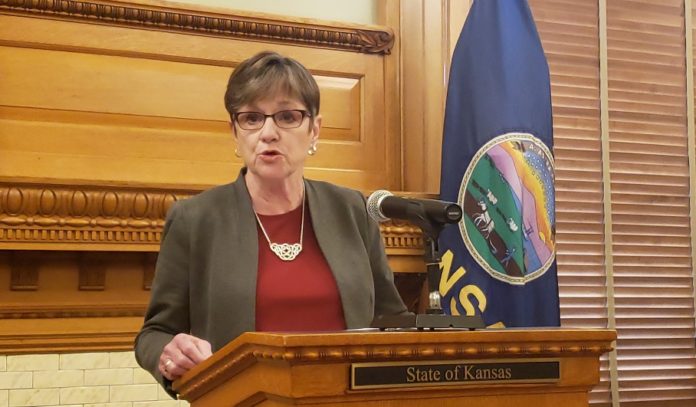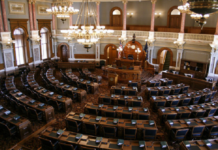Gov. Laura Kelly on Friday allowed a bill targeting diversity, equity or inclusion in Kansas higher education to become law without her signature.
The bill, passed 81-40 in the House and 28-11 in the Senate, bars universities, community colleges and technical colleges from requiring statements about diversity, equity or inclusion as a condition of admission, financial aid or hiring.
The governor allowed the bill to become law the same week that the Kansas Board of Regents adopted a policy that mirrors the law passed by the Legislature.
“While I have concerns about this legislation, I don’t believe that the conduct targeted in this legislation occurs in our universities,” Kelly said in a statement.
“We need to move forward and focus our efforts on making college more affordable and providing students from all backgrounds with the tools they need to succeed.
“I am focused on advancing policies that drive economic growth and develop tomorrow’s workforce. For that reason, I will allow the bill to become law without my signature.”
The bill was sponsored by Republican state Rep. Stephen Howe of Salina, who believed that DEI was moving higher education away from merit-based decisions to decisions based on a certain ideology.
Howe said that DEI had become part of how universities were screening applicants for jobs by asking about their experience working with people from diverse backgrounds and their commitment to diversity, equity and inclusion.
As part of the debate over DEI at the Capitol, the Legislature had added language to the state budget that would have withheld $36 million from state universities if the bill that Kelly allowed to become law on Friday wasn’t enacted.
The proviso would have moved $35.7 million from state universities to the State Finance Council.
The council, under the proviso, would hold the money unless the schools could show they haven’t participated in DEI practices related to hiring, admissions and tenure decisions.
Earlier this week, the Board of Regents adopted new policy prohibiting universities from requiring statements “pledging allegiance to, support for or opposition to” diversity, equity and inclusion in applications for admission, hiring or promotion.
Board Chair Jon Rolph, whose renomination to the board dragged on for months in the Senate because of concerns about his views on DEI, said the new policy was an attempt to show that the board is listening to the Legislature.
“This is our good faith effort in trying to listen to the Legislature as they listen to the people,” Rolph said.
“It’s a concern they brought up. It’s not something central to our practices around wanting student success in trying to fulfill our promises to people when we invite them onto our campuses,” he said.
There’s been a battle over diversity, equity and inclusion throughout this legislative session.
The Senate’s confirmation of Rolph to the board was delayed for months because concerns about his views about DEI.
And legislative auditors released an audit that detailed how much state universities had spent on DEI-related activities.
A violation of the law carries a $10,000 fine for each infraction.
The bill allows someone who believes their rights were violated to file a complaint with the Board of Regents to investigate.
If the board’s investigation doesn’t turn up a violation, a complaint could be filed with the attorney general, who would investigate.
If the attorney general finds a violation, that institution would have 90 days to remedy the violation.
If the violation is not corrected, the attorney general could take the school to court. A $10,000 fine for each violation could be levied if the court finds a violation.
Democrats called the bill an overreach, saying it treads into an area that is vague and means different things to different people.
They question what problem the bill is trying to address, noting that the words diversity, equity and inclusion are positive attributes.
“Every college and university define DEI completely differently,” Democratic state Rep. Jason Probst of Hutchinson said on the floor Friday before the bill passed.
“We don’t have a clear definition of DEI,” Probst said.
“When we go out and do an audit and try to talk to the universities about this, there’s a lot of difference of opinion on what falls under DEI,” he said.
“We’re having a discussion about this one thing that maybe we think it’s one thing, but when we put it into application it’s quite different and it’s a lot more broad than we think.”
















